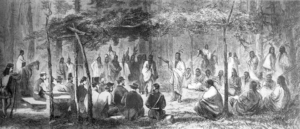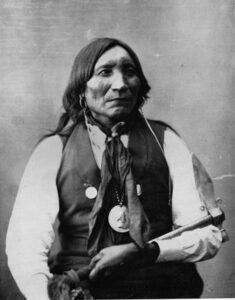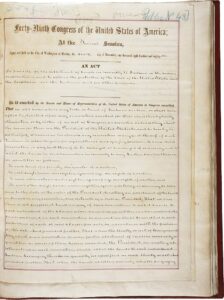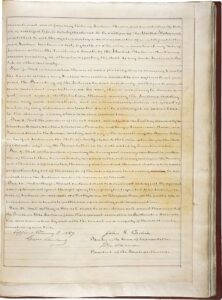 Actually, The Medicine Lodge Treaty is the name given for three treaties that were signed near Medicine Lodge, Kansas, between the Federal government of the United States and southern Plains Indian tribes on October 21, 1867. The treaties were intended to bring peace to the area by relocating the Native Americans to reservations in Indian Territory and away from European-American settlement. The Indian Peace Commission had concluded in its final report in 1868, that the wars were completely preventable. The commission determined that the United States government and its representatives, including the United States Congress, had contributed to the warfare on the Great Plains by failing to fulfill their legal obligations and to treat the Native Americans with honesty. This fact is not a new concept for anyone who has studied history at all.
Actually, The Medicine Lodge Treaty is the name given for three treaties that were signed near Medicine Lodge, Kansas, between the Federal government of the United States and southern Plains Indian tribes on October 21, 1867. The treaties were intended to bring peace to the area by relocating the Native Americans to reservations in Indian Territory and away from European-American settlement. The Indian Peace Commission had concluded in its final report in 1868, that the wars were completely preventable. The commission determined that the United States government and its representatives, including the United States Congress, had contributed to the warfare on the Great Plains by failing to fulfill their legal obligations and to treat the Native Americans with honesty. This fact is not a new concept for anyone who has studied history at all.
At the request of the tribal chiefs, the US government met the chiefs at a place traditional for Native American ceremonies. The first treaty was signed October 21, 1867, with the Kiowa and Comanche tribes. The second, with the Kiowa-Apache, was signed the same day. The third treaty was signed with the Southern Cheyenne and Arapaho on October 28, 1867. 
As expected, the Medicine Lodge Treaty, heavily favored the Congress and the white settlers. The tribes were assigned reservations of diminished size compared to the territories that had been defined in an 1865 treaty. The treaty tribes never actually ratified the treaty by vote of adult males…a requirement of the tribes. The Congress also changed the allotment policy under the Dawes Act and authorized sales under the Agreement with the Cheyenne and Arapaho (1890) and the Agreement with the Comanche, Kiowa and Apache (1892). With the agreement, signed with the Cherokee Commission, the Congress further reduced the reservation territory promised to the Indians. Lone Wolf, the Kiowa chief, immediately filed a lawsuit against the government for fraud on behalf of the tribes in Lone Wolf v. Hitchcock. The US Supreme Court ruled against the tribes in 1903, after determining that the Congress had “plenary power” and the political right to make such decisions. With the power of that decision to back them, Congress wasted no time in unilaterally acting in the same manner on land decisions related to other reservations as well.
Because of the outstanding issues with the treaty and subsequent government actions, in the mid-20th century, the Kiowa, Arapaho and Comanche filed several suits for claims against the US government. Over decades, they won substantial settlements of monetary compensation in the amount of tens of millions of dollars, although it 
 took years for the cases to be resolved.
took years for the cases to be resolved.
I don’t know what could have been done differently, exactly, other than to be completely fair with our treatment of the Indians. I have never liked the idea of forcing them to be on the reservations. The land they were given was far less than they should have received, and instead of letting them become members of society, where they could make an honest living, they were given compensation without the need to earn in, creating a group of people who could make no contribution to society at all. It basically took away their self-respect and their sense of worth…a situation which helped no one. The fighting continued until the last battle was fought on January 9, 1918.


Leave a Reply